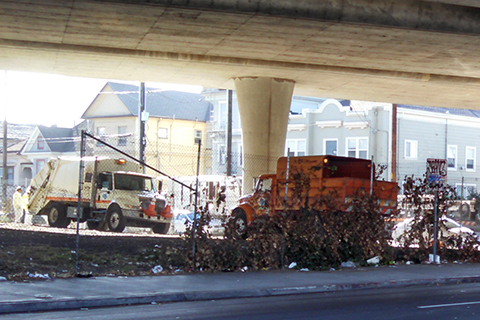Feature Archives
A lawsuit filed on December 13 by civil rights groups charges the California Department of Transportation (Caltrans) with violating the constitutional rights of homeless people by confiscating and destroying their property in ongoing sweeps. Plaintiffs have lost cherished and necessary items, including family heirlooms, photographs of loved ones, tents, sleeping bags, warm weather clothing, tools, food, camp stoves, bicycles, and personal documents. “Caltrans has been a major obstacle to getting my life together," said plaintiff James Leone. "Twice in six years, I’ve been left with only the clothes on my back. Twice I’ve lost everything I own in the world.”
Sun Dec 18 2016
Obama Signs Bill with Water Giveaway to California Big Ag
In a slap in the face to fishermen, Tribes, environmental justice advocates, conservationists and family farmers, President Obama on December 16 signed the Water Infrastructure Improvements for the Nation (WIIN) Act into law with an environmentally destructive rider sponsored by Senator Feinstein (D-CA) and Congressman McCarthy (R-CA). The controversial rider, requested by corporate agribusiness interests, allows San Joaquin Valley growers and Southern California water agencies to pump more water out of the Delta, driving numerous fish species closer and closer to extinction, according to Delta advocates.
Sun Dec 18 2016 (Updated 01/29/17)
Mobilization Against the Coronation of Trump
A large coalition, including CrimethInc. Workers’ Collective, is calling for a bold mobilization against the inauguration of Donald Trump. In addition to Washington D.C., protests will also be held in Oakland, San Francisco, San José, Palo Alto, Santa Cruz, Monterey, and communities throughout the so-called United States. A widely circulated call to action states, "On Friday, January 20, 2017, Donald Trump will be inaugurated as President of the United States. We call on all people of good conscience to join in disrupting the ceremonies."
The California Secretary of State’s Office announced that voters narrowly defeated Proposition 53, an initiative requiring voter approval of revenue bonds over $2 billion. Governor Jerry Brown is celebrating the victory because it would have required a vote on his controversial “legacy” projects, the Delta Tunnels and High Speed Rail. Dan Bacher writes: The results of the Proposition 53 vote are disappointing for those who care about salmon, the Delta and the public trust. However, there is no doubt that if an initiative solely requiring a public vote on the Delta Tunnels had been on the ballot, it would have been decisively approved.
Sat Dec 10 2016
Disastrous New City at Tejon Ranch Approved for Kern County
On December 6, the Kern County Board of Supervisors approved Tejon Ranch Company’s disastrous Grapevine project, despite the harm the project will do to wildlife and nearby communities. The 8,000-acre development will straddle the San Joaquin Valley and Tehachapi Mountains and create a new city of up to 12,000 dwelling units and up to 5.1 million square feet of commercial real estate. The project will destroy habitat for the endangered San Joaquin kit fox, blunt-nosed leopard lizard, and threatened San Joaquin antelope squirrel, along with up to 36 other rare and imperiled species.
Sat Dec 3 2016
The Unseen Power of Big Oil in California
The Western States Petroleum Association (WSPA) is not a household name in California and the West, but it should be. WSPA is the trade association for the oil industry and the largest and most powerful corporate lobbying organization in California. It represents a who's who of oil companies including Aera Energy, Chevron, California Resources Corporation (formerly Occidental Petroleum), ExxonMobil, Phillips 66, Shell, Valero and many others. Yet most people — even many environmental activists — have never heard of the organization and the enormous influence it wields over politicians and regulators in the western states.
Thu Dec 1 2016
Cannabis Company Faces Backlash for Misogynistic Display
Calls to boycott Altai Brands began after a disturbing photo was circulated on social media showing a nearly nude woman laying on a table covered in slices of salami and other meats. The event, hosted by Altai Brands, was a private after-party on November 17 for the fifth annual Marijuana Business Conference and Expo which took place from November 15-18 in Las Vegas. Aliza Sherman writes, "Altai Brands apparently went culturally tone deaf when they covered a woman in deli meats and served her up on the appetizer table. Comments ranged from shock to outrage in social media with calls to boycott the male-led company."
California:
 22
22









